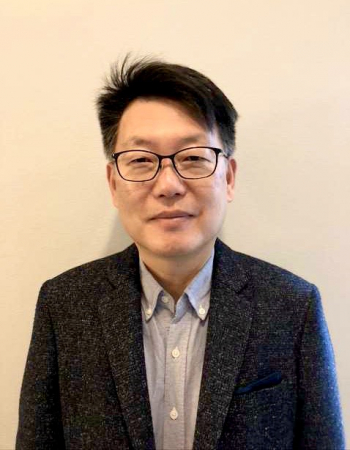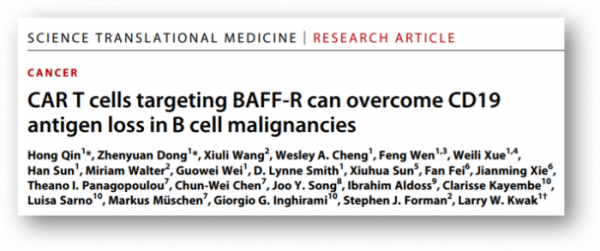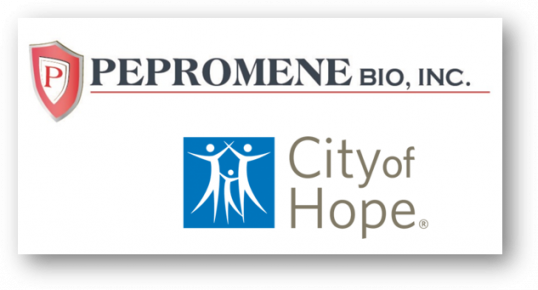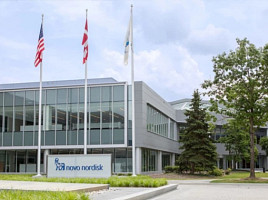기사본문
PeproMene Bio, a novel target modality 'BAFF-R CAR-T' heads into clinic
입력 2020-03-13 10:46 수정 2020-03-18 07:04
바이오스펙테이터 Sungmin Kim 기자

PeproMene Bio is going to enter the clinical development of the new target modality 'BAFF-R CAR-T' for patients with recurrent or refractory hematologic malignancies to CD19 treatment. Currently there are two commercially available CD19 CAR-T products, but there is no alternative treatment for patients with relapse after the administration of CD19 treatment.
CEO Bryan Hong Woo Kim of PeproMene Bio said, “We are going to carry out Phase 1 clinical trial on 30 adult patients with recurrent, refractory (r / r), or acute myeloid leukemia (ALL) under the initiative by the City of Hope National Medical Center (hereinafter, "the City of Hope") in the United States. At the end of last year, We had the successful pre-IND meeting with the US Food and Drug Administration (FDA). We expect to submit the investigational new drug application (IND) by the end of March and start the first administration to patients as early as June.”
PeproMene Bio is planning to enter a clinical trial in three years after licensing BAFF-R CAR-T from the research team led by Larry Kwak, Professor of Hematology and Hematopoietic Stem Cell at the City of Hope in 2017. PeproMene Bio has attracted the investment worth a total of $ 47 million so far.
PeproMene Bio has pursued the development of autologous BAFF-R CAR-T in the form of a virtual company, and has passed several milestones since its establishment. In an interview with Biospectator, CEO Bryan Hong Woo Kim provided updates on the company's recent progress and its follow-up pipeline development.
Rationale for developing a new target modality 'BAFF-R'
As CAR-T shows an unprecedented high level of therapeutic response rate compared to the existing anti-cancer drugs, the CAR-T therapy market is rapidly expanding. Until now, there have been two commercially available CD19 CAR-T products for hematologic malignancy. Liso-cel of BMS (Celgene), the third CD19 CART-T treatment, is expected to be released to the market by this year. In addition, the clinical results of allogeneic CAR-T will come out after those of autologous CAR-T.
However, there are limitations. The first problem is that relapse occurs after the administration of treatment drug. Leukemia and lymphoma patients receiving CD19 CAR-T treatment have the recurrence rate of about 30% within a few years due to antigen loss in malignant B cells. Some patients had relapse not only after CD19 CAR-T but also after Blincyto® a CD19 bispecific antibody treatment. In other words, it is important to obtain a high initial reaction rate, but the retention of drug efficacy has emerged as a critical issue.
The second problem is that no follow-up target have been released since CD19. Although CD20 and CD22 targets have been developed to address the problem of CD19 recurrence, patients still had relapse due to loss of antigen during clinic trials. There is need to develop a target capable of overcoming antigen loss in malignant B cells.
In this aspect, the differentiated property of BAFF-R is that it is a new target that has the potential to treat patients with recurrent and refractory CD19. CEO Kim said, “Currently, there is an unmet need for new target modality. BAFF-R is a critical factor in maturation and differentiation of B cells and is essential for the survival of malignant B cells. We haven't seen any example of loss of the BAFF-R antigen." BAFF-R is expressed between the end of B cell progenitor stage and the beginning of differentiation into plasma cells.

As another important milestone, Professor Larry Kwak's research team announced the first research results at the general assembly of the Science Translational Medicine and BAFF-R CAR-T showed the therapeutic efficacy of treating in malignant B-cell tumor with drug resistance due to CD19 antigen loss (doi: 10.1126/scitranslmed.aaw9414). BAFF-R CAR-T delivers humanized BAFF-R scFv as the lentiviral vector and contains 4-1BB/CD3ζ/CD8a as the intracellular signaling domain.
Another important point in an article published on the Journal of Science Translational Medicine is that BAFF-R CAR-T was confirmed to have outstanding anti-tumor efficacy compared with CD19 CAR-T. Based on these results, PeproMene Bio expected that BAFF-R CAR-T would establish itself as the first line treatment to malignant B cell carcinoma. At that time, Professor Larry Kwak stressed, "BAFF-R CAR-T can change the way of treating leukemia and lymphoma."
After the first thesis on BAFF-R CAR-T was released, partnership started to be discussed. CEO Kim explained, "It is still in an early stage. A few companies are showing interest. They equally evaluated BAFF-R as an attractive target compared to competitors. Those big pharmaceutical companies that show much interest are either trying to newly acquire CAR-T assets or have already had them."
According to the clinical timeline, initial clinical results are expected to come out between the end of this year and the first half of next year. CEO Kim explained, “We expect that a deal with a big pharmaceutical company will start in full swing when the initial safety and efficacy results come out. For instance, the acquisition deals of Kite Pharma and Juno Therapeutics, leading companies in autologous CAR-T, were announced after their clinical trial results came out."
The City of Hope conducts clinical development and manufacturing; it considers expanding indications in future
There were a few things that CEO Bryan Hong Woo Kim had to check before starting the clinical development of BAFF-R CAR-T as a virtual company. The prerequisites for clinical development are as follows: ▲ FDA-approved gene manipulation vector ▲ hospitals to carry out clinical trials ▲ GMP manufacturing facility ▲ professional staff for FDA approval.
First, PeproMene Bio in-licensed the non-exclusive right for the FDA-approved lentivirus production protocol from the City of Hope. It was the first gateway to construct CAR-T cells for the purpose of delivering CARs that detect BAFF-R in T cells of patients.
The next step was to secure an FDA-approved GMP production facility for clinical approval. CEO Kim said, “CAR-T is a unique treatment that connects manufacturing facilities with hospitals. CAR-T has the concept of extracting blood from patients' body and then genetically manipulating and reinjecting them into their own immune cells. It is important to have a production facility to conduct a clinical trial on BAFF-R CAR-T clinical trial. It is still a new field, so there are few CROs available yet.”
Against this background, leading companies such as Juno Therapeutics and Kite Pharma have already built their own GMP manufacturing facilities, and newly promising companies such as Tmunity and Allogene recently attracted investments worth hundreds of billions KRW for clinical development and manufacturing facilities. In order to operate the facilities, dozens to hundreds of professional staff members are required.
Thus, PeproMene Bio decided to speed up the clinical development of BAFF-R CAR-T, a candidate therapeutic agent for malignant B-cell carcinoma, by utilizing the knowhow and human resources of the City of Hope and its FDA-approved facility and protocol instead of building its own facility.
In this aspect, the City of Hope has unique advantages. The City of Hope is a hospital with its own CAR-T GMP facility and is the only institution that has been conducting CAR-T clinical trials for over 15 years. The City of Hope is now conducting 15 clinical trials on a wide range of indications including leukemia, lymphoma, multiple myeloma, brain cancer, and solid cancer.

Last year, PeproMene Bio set a milestone to concluded a clinical trial agreement on manufacturing BAFF-R CAR-T and Phase 1 clinical trial with the City of Hope. As a result, Phase 1 clinical specimens of BAFF-R CAR-T will be produced at the Center for Biomedicine & Genetics, the GMP production facility of the City of Hope.
In addition, PeproMene Bio formed a project team called 'INDuarte,' which is responsible for preparing pre-IND to IND to proceed with the FDA approval process. CEO Kim said, “There were positive responses at the pre-FDA meeting. The team is now the middle of finalizing the IND protocol and plans to submit the documents required for IND after completing the review of the protocol by the end of February."
The City of Hope plans to start Phase I clinical trial on 30 patients with recurrent or refractory acute myeloid leukemia (ALL), including CD19 negative (-) patients who relapsed after having receiving CD19 treatment since June. In Phase 1 clinical trial, the safety of the drug is evaluated and an appropriate dose for phase II clinical trial will be identified. The clinical sponsor is PeproMene Bio.
The possibility of expanding indications in future will also be evaluated. CEO Kim said, “We have already confirmed positive efficacy in mantle cell lymphoma (MCL). We are now under review of expanding further to other indications. We are discussing clinical trials for expanded indications with Dr. Michael Wang, professor in the Department of Lymphoma and Myeloma at MD Anderson.”
PeproMene Bio is also seeking a global partnership for CAR-T manufacturing and logistics (all distribution processes including sample preparation, production, storage and sales) in consideration of Phase 2 clinical trial and commercialization. This is because CAR-T treatments are dependent on manufacturing, logistics, and hospital networks in the process of commercialization. Recent technology advances include fully-closed and automated systems designed to reduce the risk of autologous CAR-T contamination.
The most likely place is Lonza. Lonza has built a functionally closed and automated GMP system (automated GMP-in-a-box) that can produce autologous CAR-Ts. The Cocoon™ Platform, an isolated bioreactor GMP system, is said to be a highly efficient system to handle multiple CAR-T products customized to each patient. It has yet to be released to the market and in now in the process of looking for a partner.
In addition, the GE has developed a liquid nitrogen-free freezer system for transportation of CAR-T cell therapy products. Currently, it is difficult to transport CAR-T cell therapy products because of the need for nitrogen-induced freezing. Miltenyi Biotec has its one-stop manufacturing platform called CliniMACS Prodigy®.
Follow-up projects in operation: 'Allogeneic BAFF-R'
As another important milestone, the company will enter the development of a follow-up program, the BAFF-R allogenic version. PeproMene Bio licensed CD3xBAFF-R bispecific antibody from the City of Hope at the end of last year and is currently in the process of optimizing candidate substances through CRO.
Similar to Amgen's BiTE, it has the format of linking two scFv peptide molecules, and it binds to CD3 (FCM63 sequence) that comprises T cell receptor (TCR) complex and to BAFF-R in malignant B cells. The CD3 bispecific antibody has a similar concept to CAR-T, in that it attracts T cells to the tumor site, and the platform is clinically proven to have anticancer activity.
The development of allogeneic BAFF-R CAR-T will be carried out in the form of partnership. Some allogenic CAR-T companies contacted the company to discuss the applicability of their platforms to BAFF-R. CEO Kim said, "We don't have a plan to develop allogeneic CAR-T by ourselves. This is because I thought there would be many obstacles to overcome before commercialization. For instance, It may need gene-editing technology and several additional manipulations to develop allogenic CAR-T platform. Also, the drug efficacy or persistence of autologous CAR-T are not as good as allogenic CAR-T platform. There is concern about possible side effects of graft-versus-host disease (GvHD).”
Then, if multiple treatments of the same target come out in the market, can this intensify the competition?. On the contrary, it is expected that the commercialization of multiple modalities targeting BAFF-R will have a positive effect on expanding the market.
CEO Kim said, “Allogeneic treatment cannot simply replace autologous treatment, and I think both are needed. This can expand treatment options for patients. For example, antibodies and CAR-T have different kinetic properties in the body. Antibodies immediately develop cytokine syndrome, but CAR-T appears late. Rather, if the two drugs are used together properly, it will generate synergistic effect to treat patients.”
In addition, PeproMene Bio is also introducing multi-target CAR-T. It is designed to increase the efficacy of CAR-T and reduce the risk of recurrence by targeting multiple antigens simultaneously.
"The ultimate goal is to provide new treatment alternatives for patients with CD19 relapse"
PeproMene Bio is entering the development phase in three years after its foundation. Considering the timeline for the future clinical results, it will take no more than 5 years to obtain the clinical results. The CAR-T development process usually requires large-scale investments, but the company minimized the funds and investment in human resources. This raises the question how CEO Bryan Hong Woo Kim came to think it possible to develop BAFF-R CAR-T in the form of a virtual company.
CEO Kim said, “When starting the project, I had to predict the input and output regarding the possibility of commercialization. It was important to be confident that a new technology called BAFF-R CAR-T could be commercialized. It didn't matter who developed the technology. It was important whether we could find out resources available to develop BAFF-R CAR-T, and if any, it could be possibly commercialized."
He saw the possibility. That was why he founded the company. Because the City of Hope had the all-in-one platform to handle all processes, he could establish a virtual company without internal investment and develop CAR-T through a contract with the validated institution. PeproMene Bio has served as the hub to connect information with resources and have successfully carried out a series of processes because of a lasting trust relationship with the City of Hope.
Currently, the strategic partner of PeproMene Bio is only the City of Hope. PeproMene Bio plans to look for global strategic partners in the future and is also considering an IPO on the NASDAQ Stock Exchange. If there is a right partner for Korean market, the company will build a strategic cooperation relationship through technology transfer.
Against the background of this decision, CEO Kim said, “It is the matter of scaling up from the commercialization stage. I think It is appropriate for a specialized big pharma to do the job. As big pharmaceutical companies in Europe and the United States are showing great interest, we can possibly find a right partner ready for CAR-T production, development and commercialization." The ultimate goal of PeproMene Bio is to provide a new treatment to patients with relapse after being administered with CD19 treatment but with no alternative treatment . CEO Kim stressed, "What is the most important is to get approval for the treatment as quickly as possible, and we'll do our best to make it possible."







